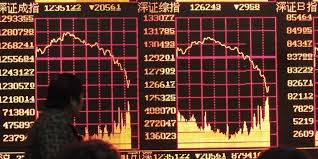In China, stocks crashed on day one of 2016. No one really knows why. Some hardy souls blamed the manufacturing index that came in even lousier than in November. But manufacturing has been consistently lousy, and bad numbers are nothing new and not a reason for the sudden plunge in stocks. Whatever the reasons, the Shanghai Composite plunged 6.9%, the …
Why the Black Hole of Deflation Is Swallowing the Entire World … Even After Central Banks Have Pumped Trillions Into the Economy
Many high-powered people and institutions say that deflation is threatening much of the world’s economy … China may export deflation to the rest of the world. Japan is mired in deflation. Economists are afraid that deflation will hit Hong Kong. The Telegraph reported last week: Read More
Weekly Commentary: New World Disorder
The Federal Reserve is flailing and global currency markets are in disarray. Notably, the Brazilian real dropped more than 10% in five sessions, before Thursday’s sharp recovery reversed much of the week’s loss. This week the Colombian peso dropped 3.0%, and the Chilean peso fell 3.1%. The Mexican peso dropped 1.9%. The Malaysian ringgit sank 4.5% for the week, with …
Pepe Escobar – Brave (miserable) new normal world
Shares in the Shanghai/Shenzhen soared a whopping 150 percent in the 12 months up to mid-June. Small investors – almost 80 percent of the market – believed in a never-ending party, and often borrowed heavily to be part of the “get rich is glorious” bonanza. There had to be a correction. Those shares – which had hit a 7-year peak …
Alternative Visions – Global Stock Markets Plunge—What’s Next? – 08.21.15
Dr. Jack Rasmus looks at today’s, and this past week’s, plunge in global stock markets from Shanghai to New York and beyond. What’s driving the rout, which recorded nearly 10% drop in stock values in just one week? Jack explains the causes behind the stock bubbles’ rise before this summer, focusing on China’s 120% bubble in 2014-15, now sharply contracting by 35%, and the bubble in US stocks that have risen 180% since 2010, and are now about to follow China’s stock contraction. Europe and other Asian markets are following the China-US connection in turn. Jack explains how the stock bubble in the US has been a consequence of the US central bank pumping $15-$20 in excess liquidity into the economy since 2009 via its zero rate and QE programs. In China, the shift to a monetary first policy in 2013 has caused excess liquidity on a similar scale. China’s real economy has been slowing since 2012. To offset the slowdown, China policy makers focused on stimulating stocks for various reasons: to quell other bubbles in housing and industrial debt, to shift toward more private sector driven growth, and to attract more foreign money capital. How China lost control of its stock bubble is explained, as well as the failed attempts since June to control the stock collapse and restimulate its real economy. Jack predicts the troubles in the global economy are about to get even worse in coming months.’
Summarizing The “Black Monday” Carnage So Far
It’s officially Black Monday, if only in China for now. We warned on Friday, after last week’s China rout, that the market is getting ahead of itself with its expectation of a RRR-cut by China as large as 100 bps. “The risk is that there isn’t one.” We were spot on, because not only was there no RRR cut, but …
Alternative Visions – Is the Global Economy Heading for Another Financial Crisis? – 08.08.15
Jack Rasmus follows up the previous show on the global economy with an assessment of financial instability that appears to be growing globally as well. Jack briefly discusses how excess debt and income decline and stagnation basically cause financial instability, and explains how the new 200,000 or so global finance capital elite continue to create financial asset bubbles worldwide and how those bubbles appear to be converging. Financial bubbles that appear most unstable include China’s stock markets (Shanghai and Schenzhen), but also global oil and commodity futures, emerging market equity and bond markets, US and global bond ETFs sold by mutual funds, the US and Euro corporate junk bond markets, tech stocks, Eurozone banks, and currency exchange markets that are becoming much more volatile. Also noted are potential serious secondary effects of a lack of liquidity in bond markets in general and effects on US repo markets in turn. The show concludes with a in-depth look at causes behind the current China stock market collapse which, Jack argues, has yet to run its full course and could destabilize financial markets worldwide in the near future. The role of China government policies in causing a runup of 120% in China stocks in just one year is explained, as well as government measures introduced since June 12 of this year to stop the stock slide.
Pam Martens and Russ Martens – Chinese Stocks Crash Overnight; Will We See Another “Glitch” in New York
Despite unprecedented efforts by the Chinese government to stem the rout in the Chinese stock market that had shaved as much as $4 trillion from share prices before the government’s interventions this month and last, the Shanghai Composite closed down 8.48 percent today at 3,725.558. The overnight rout has raised speculation in some quarters as to whether we are going …
China’s Market Falls: a New Global Financial Crisis Next? By Jack Rasmus
China’s two main stock markets, the Shanghai and the Shenzhen Exchanges, plunged more than 30% in recent weeks from their previous record highs of June 12. The Shanghai dropped 30%, and the tech-stock heavy Shenzhen by 37%. That’s the steepest stock decline in China since 1992. The markets briefly stabilized on July 9. But the question remains, will they continue …
China share rout hits global markets By Nick Beams
Chinese financial authorities have banned major shareholders, corporate executives and directors from selling their shares in listed companies for a period of six months. The ban is the latest in a series of increasingly desperate moves to try to halt the crash of the Chinese stock market, amid indications it is beginning to impact on the rest of the world. …








